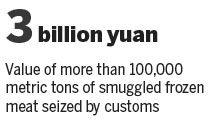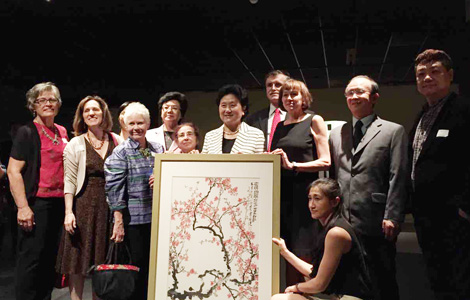14 gangs busted for smuggling frozen meat
Updated: 2015-06-24 07:41
By He Na(China Daily USA)
|
||||||||
Fourteen gangs involved in the smuggling of frozen meat products that pose huge health risks have been hunted down and the products seized in a recent crackdown, the General Administration of Customs said.
Customs officials sealed more than 100,000 metric tons of smuggled frozen meat worth up to 3 billion yuan ($483 million), including frozen chicken wings, beef and pork, the administration said.
The crackdown took place in June in 14 provinces and regions.
The Changsha Administration of Customs in Hunan province broke up two gangs with 20 members suspected of smuggling frozen meat products on June 1 and seized 800 tons of products worth more than 10 million yuan.
It is the largest case involving smuggled frozen meat products in the province's history.
"The products fully filled an entire compartment. It was smelly, and I nearly threw up when I opened the door," said Zhang Tao, an administration official.
According to Yang Bo, deputy director of the Anti-Smuggling Bureau of the Changsha Administration of Customs, smuggled meat products are not inspected, and this is unsafe because people may get life-threatening illnesses if they eat products that have bacteria and viruses such as bird flu or foot-and-mouth disease.
Yang said another problem with smuggled meat is that much of it has expired.
Officers from the Guangxi Zhuang autonomous region's Administration of Customs found that some of the confiscated smuggled frozen meat is far older than the given expiration dates suggest, with some being more than 40 years old.
Experts say that as long as frozen meat shows no signs of thawing, customers can't tell fresh meat from bad meat that is decades old.
When smuggled meat is moved under poor conditions or repeatedly thawed - or even refrozen after the meat has already gone bad - the threat it poses will be especially serious.

Changsha customs said that high profits have already spurred the creation of an extensive supply chain.
Smugglers generally purchase meat for very low prices from foreign countries, and then have it delivered to Hong Kong in refrigerated containers.
The products will then be moved to the mainland via Vietnam, with smugglers hiring residents of border areas to move the products to Chinese border cities and then on to Changsha before the products are transported to sites around the country.
"To save costs, smugglers often hire ordinary vehicles instead of refrigerated ones. So the meat has often thawed out several times before reaching customers," said Yang, deputy director of the anti-smuggling bureau.
The boom in sales of agricultural products on Internet platforms also assists smugglers.
Experts called for the establishment of a nationwide supervision network and enhanced controls in border regions to prevent the products from entering China.
Xinhua contributed to this story.
hena@chinadaily.com.cn
(China Daily USA 06/24/2015 page5)

 Ten photos you don't wanna miss - June 23
Ten photos you don't wanna miss - June 23
 The world in photos: June 15-21
The world in photos: June 15-21
 Kris Wu's long legs trigger envy
Kris Wu's long legs trigger envy
 School dropout farmer creates robots
School dropout farmer creates robots
 Typhoon Kujira makes landfall in S China
Typhoon Kujira makes landfall in S China
 Liu visits Houston Museum of Natural Science
Liu visits Houston Museum of Natural Science
 Liu meets Tsinghua Youth team in Houston
Liu meets Tsinghua Youth team in Houston
 Men get into women's shoes for fun
Men get into women's shoes for fun
Most Viewed
Editor's Picks

|

|

|

|

|

|
Today's Top News
Xi points way for Sino-US ties
Xi pins high hope for S&ED
China, US need 'common ground'
Liu challenges university leaders
10 chosen for Eisenhower fellowships
China unveils plans for V-Day parade
China-US talks to explore ways to make Xi's visit a success
Chinese consumers play big part in Apple's designs: Cook
US Weekly

|

|